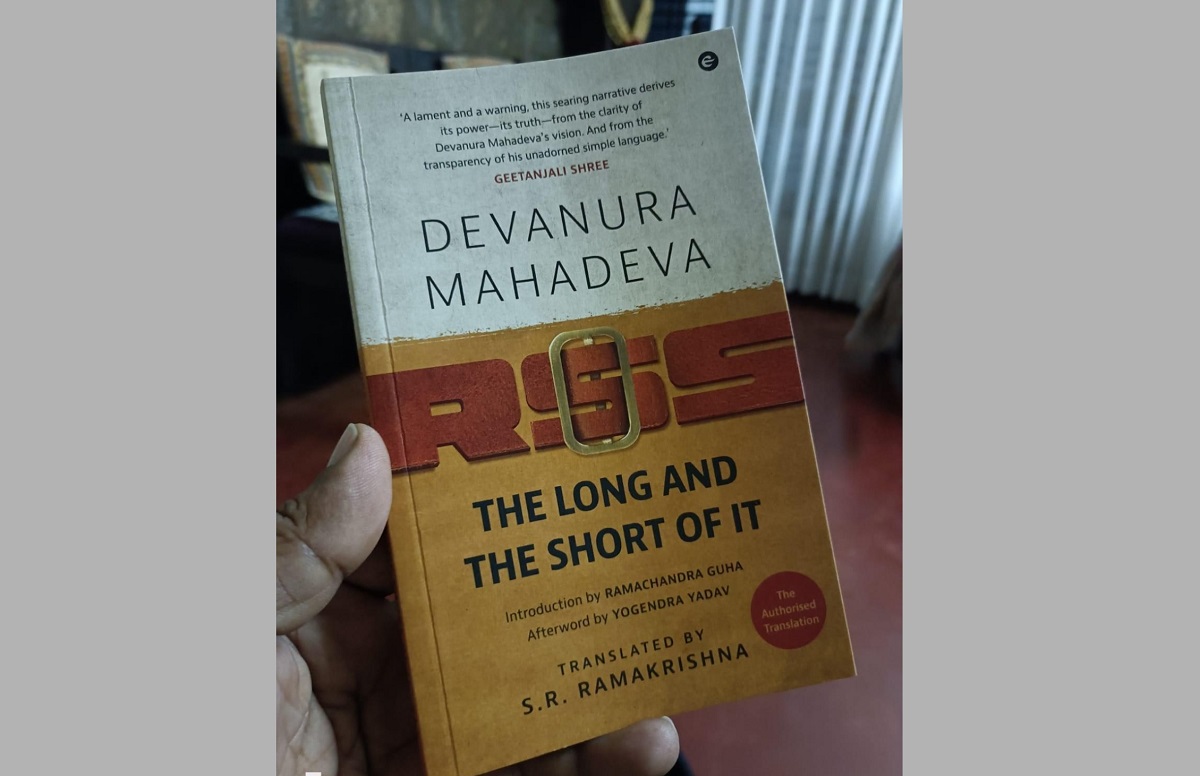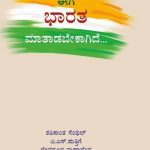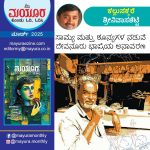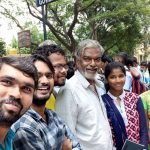How the RSS’, Golwalkar, HMS’ Savarkar glorified caste: Devanur Mahadevan
[Sabrangindia carried a review of the book ‘The RSS- The Long & Short of It’ by- Devanur Mahadeva, on 21 Nov 2022. ದೇವನೂರು ಮಹಾದೇವ ಅವರ “ಆರ್.ಎಸ್.ಎಸ್. ಆಳ ಮತ್ತು ಅಗಲ” ಪುಸ್ತಕದ ವಿಮರ್ಶೆಯನ್ನು 21 ನವೆಂಬರ್ 2022 ರಂದು ಸಬ್ ರಂಗ್ ಇಂಡಿಯಾ ಪ್ರಕಟಿಸಿತ್ತು.]
[Devanur Mahadeva, The RSS- The Long & Short of It– available in English; Price Rs 199; to obtain a copy of the book, contact publishers Abhiruchi Prakashan Mysore -9980560013]
https://sabrangindia.in/article/how-rss-golwalkar-hms-savarkar-glorified-caste-devanur-mahadevan
Laced with quotations from Golwalkar and Savarkar of the RSS and Hindu Mahasabha themselves, this work, now available in Tamil, Telugu, Malayalam and English, sharply critiques the far right’s worldview on caste exclusion and discrimination

The Kannada language author of the path-breaking novella Kusumabale, and writer of several short stories, Devanura Mahadeva, one of Karnataka’s most prominent public intellectuals has now brought us The RSS-The Long and Short of It, a work endorsed by renowned author, Geetanjali Sree with an introduction and afterward by Ramchandra Guha and Yogendra Yadav respectively. This book, translated by S.R. Ramakrishna into English is now available.
Respected for his work with not just Dalits and Adivasis, but forging links with seminal struggles for democratic and minority rights, the publication of this pamphlet in July first drew the predictable abuse from the trolls and their mentors, in a failed attempt to discredit the author and the book. Devanur Mahadeva is a particular sore eye for the right because of his vocal advocacy of inter-faith harmony. Recently, when a socio economic boycott of Muslims selling halal meet was sought to be incited, Mahadeva displayed his public commitment to constitutional values by going to a market in Mysuru to buy halal meat!
How the RSS and HMS endorse caste
The text begins with quotations from MS Golwalkar and VD Savarkar, two major ideologues who have shaped political Hinduism, Hindutva. The quotations, earlir analysed by Sabrangindia, show Golwalkar not just justifying the caste system and its in-built hierarchies, on the grounds that they have scriptural sanction, but uncritically rooting for a society based on this brazen inequity. There is also Savarkar urging worship of the Manusmriti, notwithstanding the fact that its endorsement of caste and gender inequalities is so antithetical to the Indian Constitution. The Savarkar quote chosen by Mahadeva is revealing:
“Manusmriti is that scripture which is most worshipable after Vedas for our Hindu Nation and which from ancient times has become the basis of our culture-customs, thought and practice. This book for centuries has codified the spiritual and divine march of our nation. Even today the rules which are followed by crores of Hindus in their lives and practice are based on Manusmriti. Today Manusmriti is Hindu Law. That is fundamental.”
Golwalkar, the RSS’ major ideologue –with publications like We Or Our Nationhood Defined (the first, 1947 edition is available on Sabrangindia) and Bunch of Thoughts, calls the federal system of a union of states “poisonous”, urging instead a unitary political system based on the homogenising principle of “One Country, One State, One Legislature, One Executive’’.
Read Sabrangindia’s Exlusive, In Defence of Caste & against Cross-Breeding, 2016 in which, Golwalkar is defending Caste. In the course of a speech given in Gujarat, he then said:
“Today we try to run down the Varna system through ignorance. But it was through this system that a great effort to control possessiveness could be made…In society some people are intellectuals, some are expert in production and earning of wealth and some have the capacity to labour. Our ancestors saw these four broad divisions in the society. The Varna systemmeans nothing else but a proper co-ordination of these divisions and an enabling of the individual to serve the society to the best of his ability through a hereditary development of the functions for which he is best suited. If this system continues a means of livelihood is already reserved for every individual from his birth.”
[M. S. Golwalkar cited in Organizer, January 2, 1961, pp. 5 & 16. He had been invited in 1960 to address the students of the School of Social Science of Gujarat University on December 17, 1960]
While none of this is unknown, per se, the political coming of age and to power of the Sangh, has dimmed its wider dissemination, of late. Timely as this work then is, is the fact that Devanura Mahadeva draws our attention to the banality of what passes for thinking in the RSS. While the seminal political text to guide the re-organisation of the Indian state is We Or Our Nationhood Defined, efforts by the RSS to post facto “disown” it when they own up in toto to Golwalkar, takes is to his second work, Bunch of Thoughts. This is a book of Golwalkar’s entitled Bunch of Thoughts. Mahedeva writes, “If you look inside this book for anything that could be considered a ‘thought’, or ‘chintane’, you will find absolutely nothing. What it offers is only a set of random, dangerous beliefs, and that too from a bygone time.” (Having read the book several times myself, I entirely concur with this judgment). The RSS’s ideology is so narrow-minded that, as Mahadeva remarks, “forget about anyone else, no sensible Brahmin even can accept this devilish view of the past that the RSS presents”.
Mahadeva is a self-proclaimed defender of the Indian Constitution. For all the lip service leaders of the RSS and BJP pay to that document, in truth they are deeply averse to its core tenets such as pluralism, caste and gender equality, freedom of speech, and federalism. Mahadeva goes so far as to suggest that “the more they damage the Indian Constitution, the more victorious they feel.”
He continues: “To destroy the Constitution, the RSS and its affiliates are committing unspeakable acts. They are playing games they shouldn’t be playing. And not just one or two! They are waging a war to overturn the federalism that binds the states and the union government, and that constitutes the bedrock of the Constitution.”
Mahadeva acidly remarks that since coming to power in 2014, “the BJP has offered Golwalkar its guru dakshina by burying federalism, by stifling to death the federal system that constitutes a critical part of the Constitution”.
Distortion and manipulation of history and fact, peddling stereotype, while using violence to generate a climate of perpetual insecurity and fear are their credos, the author states that “Falsehood is their family deity.” He de-constructs and analyses many distortions propagated in textbooks published by BJP Governments controlled by the RSS, which seek to prejudice the minds of our children with hatred for fellow citizens who do not happen to be Hindus.
Political Critique
Mahadeva also analyses how a degeneration of political parties and politics have allowed the RSS and the BJP to foster roots and grow: “When you look at India’s political parties, these are the facets you see: 1) single-person led party (2) family-controlled party (3) a party led by an anti-Constitution organisation. All three are detrimental to democracy.”
Coming to contemporary times, since the RSS-led BJP government came to power at the centre in 2014, Mahadeva also talks of the promises made by the RSS pracharak Narendra Modi when he came to power, such as the return of black money, the doubling of farm incomes, the generation of millions of jobs. These promises have remained wholly unfulfilled. Instead, economic inequalities and disparities of wealth have grown alarmingly. Burgeoning crony capitalism spiralled by de-monetization that killed India’s informal sector and medium scale enterprises (MSMEs), only two corporate lords have benefitted this decimation during Modi’s prime ministership: Gautam Adani and Mukesh Ambani (both incidentally from the prime minister’s home state, Gujarat).
The ideological critique of the RSS and the BJP that constitutes the heart of the exercise… In the space of a few thousand words, Mahadeva lays bare the intrinsic authoritarianism, its casteism, and its majoritarianism of the RSS, BJP and its affiliates, Vishwa Hindu Parishad (VJP) and Bajrang Dal (BD). Mahadeva’s work, easily readable is a much needed text to counter the political hegemonising by the RSS-BJP. Before assuming political power, the infiltration of men and women of this ideology into positions of governance enabled them to assume power; now they enable these forces to retain it.
Karnataka, Mahadeva’s home state has seen violent polarisation, hate politics and even attacks on minority cultural sites and places of worship, under the BJP. This state goes to the polls next year. If this politics of caste hegemony and majoritarianism is not checked, this would signal the decline or end of the region’s pluralist and humanist traditions. It is this imminent, lurking danger that leads Devanura Mahadeva to give out a gentle call to action, a plea to all those who oppose the RSS and the BJP to come together on a common platform to restore the foundations of the Republic and rescue it from being further ravaged by the fanatics on the Right. It is worth quoting his call at some length:
“At least now, forward looking groups, organisations and parties should rise above being just little streams; they should flow collectively as one river. To be able to do that, they must abandon the unhealthy attitude of being pure and superior to others. They must give up their ego, and develop the humility to accept that hundreds of paths might exist for attaining an aim. They must put an end to their leadership squabbles. Rather than insist narrow-mindedly that they lead, or that their party lead, they must join a broad alliance to save federalism and the Indian Constitution and the diversity that is the life breath of India. They must come together to build a participatory democracy, where all citizens and communities participate, to create a culture that is tolerant, loving and free of distinctions of high and low.”







